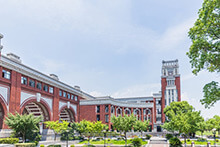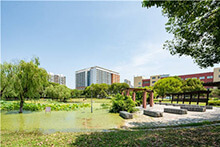青岛科技大学海洋科学与生物工程学院生物质化工硕士 正文
生物质化工学科硕士研究生培养方案
Training Schedule of Master Degree of Biomass Chemical Engineering
专业代码: 0822Z2 学科门类: 工 学
Code of Specialty: 0822Z2 Department of Discipline: Engineering
二级学科: 生物质化工 学分要求: 40 ~ 42
Second-grade Discipline: Biomass Chemical Engineering Credit Setting: 40 ~ 42
一、学科、专业简介 (Disciplines Instruction)
生物质化工是一门随着生物质科学在各领域的广泛应用而诞生的交叉学科,是以生物质资源材料为原
料进行开发利用为基础的应用性极强的学科,也是化工科学中发展最为迅速的学科。它涉及了微生物学、
生物工程、轻工技术与工程、化学工程的内容。现代的生物质产业是指利用可再生或循环的有机物质,通
过工业性加工转化,提供生物基产品和生物能源的环境友好产业。
Biomass Chemical Engineering is a interdiscipline borned with the wide application of biomass in various
fields, a discipline with high applicability on the basis of exploiting and using biomass resources, as well as a
discipline with fastest-growing rate among that of chemical engineering. This discipline involves the details of
microbiology, biotechnology, light chemical engineering and chemical engineering. The modern biomass chemical
engineering means provide a eco-friendly industry with biomass products and bio-energy gained by the industrial
transformation of renewable or organic substance.
本学科是以我校轻工技术与工程硕士学位一级学科点的优势为基础,面向生物质化工利用及其清洁化
生产技术所建成的一个具有较强工程技术综合优势的二级学科。本学科师资力量雄厚,职称、年龄结构合
理;教学科研条件良好,设备仪器齐全。配有荧光显微镜、凝胶扫描仪、冷冻离心机、自动发酵罐、高速
离心机、超低温冰箱、高效液相色谱仪、气相色谱仪、核磁共振波谱仪、电子显微镜、超薄切片机、恒温
振荡培养箱、ICP 发射光谱仪、FT-IR 红外光谱析仪、原子吸收光谱仪、PCR 仪、数码显微系统、高压多用
途电泳仪等先进仪器设备。
This discipline is a second-level subject established on the basis of our first-level discipline master's degree
programs—light industry technology and engineering, with high engineering technology comprehensive
advantages facing the use of biomass chemicals and corresponding cleaner production technology. At present, this
discipline possesses solid qualified teachers with rational technical titles and age structure, and is provided with
good conditions for both teaching and research. Many modern instruments and equipments, such as fluorescence
microscope, gel scanner, refrigerated centrifuger, fermentation cylinder, supercentrifuge, ultra-low temperature
freezer, high performance liquid chromatograph(HPLC), gas chromatography(GC), nuclear magnetic resonance
spectrometer, electron microscope, ultra microtome, constant temperature oscillation incubator, ICP emission
spectrometer, FT-IR, atomic absorption spectrometer, PCR, digital microscopy system and multipurpose
electrophoresis apparatus are equipped in the laboratories.
二、培养目标(Objectives of Training)
主要培养德、智、体全面发展的应用型、复合型人才。硕士学位获得者掌握生物质领域的基本知识和
技能,熟悉生物质能源开发和利用、生物质材料技术在农业和工业中的应用。具有较强的实践动手、解决
实际问题的能力,并具有一定的创新能力,熟练掌握一门外语,能够承担高等院校、科研院所、企业中相
关专业技术或管理工作,成为具有良好职业素养的高层次应用型和复合型专门人才。
This discipline aims to turn out practical and inter-disciplinary talents with all-around development in moral,
intellectual and physical education, who should grasp the basic knowledge and skills, be familiar with the
development and utilization of biomass energy as well as the application of biomass materials technology in
agriculture and industry .The master’s degree recipients are trained to acquire strong capacity of innovation,
practice and solving problems, master a foreign language, be able to be engaged in relevant professional
techniques or management work in universities ,scientific research institute and companies, become high level
trained personnel with professional accomplishments.
三、学制及学习年限(Educational System and Length of Schooling)
硕士研究生学制为 2~3 年,可根据实际情况允许研究生提前或延期毕业,一般不超过 4 年。课程学
习为 1~2 学期,论文工作不少于 1 年。硕士生课程学习实行学分制,至少应修 40 学分, 其中学位课程≥18
学分,研究环节 13 学分。
The basic length of schooling for master's postgraduate education shall be two to three years, the
postgraduates are allowed to graduate according the actual requirements,but always less than four years. The
length of curriculum is usually one to four terms, and the time of writing a paper is at least one year. The studying
of master's post graduate courses carry out the credit system, the students should obtain forty to forty-two credits
during the studying. The degree courses are at least eighteen credits, the research links are thirteen credits.
四、研究方向(Research Orientation)
序号
NO.
名 称
Name
研究方向及特点
The Research Orientation and characteristic
1
生物质基新材料
Biomass Advanced
Materials
研究将生物质材料(纤维素、半纤维素、木质素、淀粉、甲壳素、
瓜尔胶、蛋白质等)转化为能源或高附加值功能材料的原理和应用技术。
Focus on the research of basic theory and practical technology on the conversion
biomass (cellulose, hemicellulose, lignin, starch, chitin, guar gum, protein, etc.) into
energy resource or high value-added functional materials.
2
生物质精细化学品
Biomass fine chemicals
研究生物质原料的物理、化学及生物改性手段及其功能性衍生物的开
发。
Focus on the physical, chemical, and biological modification of biomass resources
natural products and development of their functional derivatives.
3
生物质能源
Biomass Energy
研究以农林有机废弃物和能源植物等为原料生产新兴能源,缓解能
源危机。
Focus on the production of renewable energy with agroforestry organic wastes and
energy plants, etc.
课程教学(Course Teaching)
研究生课程实行学分制,分为学位课和非学位课两部分,每个专业应积极创造条件逐步做到至少有一
门专业课用外语讲授。每位研究生在学期间应修完个人培养计划中所要求的学分,方能进入中期考核。
The courses are divided into two parts, degree courses and non-degree courses, with an assessment system
of credit. Each specialty should actively create conditions to gradually achieve that at least one specialized course
should be given in English. Each postgraduate should complete the required credits in the cultivation plan to enter
the mid-term assessment.
研究生课程的教学方法应建立以研究生为主体的教学方式,充分发挥研究生的主动性和自觉性,更多
地采用启发式、研讨式及参与式的教学方法。课程考核分考试与考查,除特殊情况外,学位公共课一般采
用闭卷考试。学位基础课、学位专业课采取闭、开卷考试与考查相结合的方式。
Student-oriented teaching method should be established, making full use of students’ initiative and
self-consciousness, adopting heuristic, seminar-style and participatory means more. Examination and test are used
to evaluate students. Except politics for Doctor’s Degree, public degree courses generally use a closed-book exam.
Basic degree courses and professional degree courses use a combination of closed-book, open-book exam and
test.
七、论文的要求(Dissertation Requirements)
学位论文是硕士研究生培养的重要要组成部分。论文涉及内容应选对我国经济和社会发展有切实相关
意义的课题或是学科前沿课题;学位论文要突出创新性、前沿性和科学性。课题研究与论文撰写是对研究
生进行科学研究或承担专门技术工作的全面训练,是研究生综合运用所学知识,发现问题、分析问题和解
决问题能力的过程,是对研究生综合能力的评判。
This is a major component in the process of cultivating postgraduate students. Research paper should focus
on issues that have great significance for China's economic and social development, or is the frontier, important
subject. The dissertation should be innovative and scientific. This is a comprehensive training of what the students
are researching or undertaking specialized tasks, a process of finding, analyzing and solving problems, and a
judgment of a student’s comprehensive abilities.
学生应在导师的指导下,在第 2~3 学期在一级学科范围内确定论文题目、制定研究计划,并经研究
室审核后报研究生部,并接受研究生部和学院的定期检查。学位论文必须独立完成,要做到资料可靠,理
论正确、思路清晰、有创新点。按照《中华人民共和国学位条例》和《青岛科技大学硕士学位授予工作细
则》的规定,经答辩合格者授予硕士学位。
Students should choose topics, make plans, and submit to the postgraduate department under the guidance
of supervisors in the second or third term. The dissertation should be finished independently, with reliable
resources, correct theories, clear thoughts and creative ideas. Those who pass the graduation oral examination
through the discussion of College Degree Assessment Points Committee, after being reported to and approved by
School Academic Degree Evaluation Committee, will be awarded a Master’s degree
青岛科技大学
添加青岛科技大学学姐微信,或微信搜索公众号“考研派小站”,关注[考研派小站]微信公众号,在考研派小站微信号输入[青岛科技大学考研分数线、青岛科技大学报录比、青岛科技大学考研群、青岛科技大学学姐微信、青岛科技大学考研真题、青岛科技大学专业目录、青岛科技大学排名、青岛科技大学保研、青岛科技大学公众号、青岛科技大学研究生招生)]即可在手机上查看相对应青岛科技大学考研信息或资源。


本文来源:
http://www.okaoyan.com/qdkjdx/yjsy_280758.html 
























































































